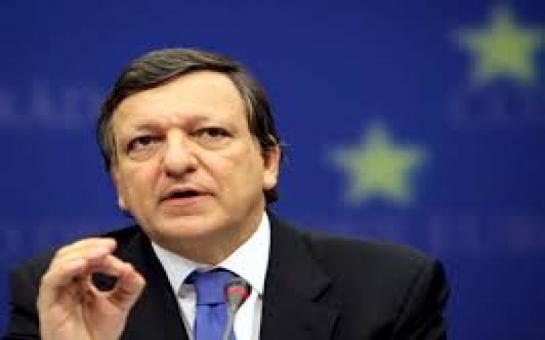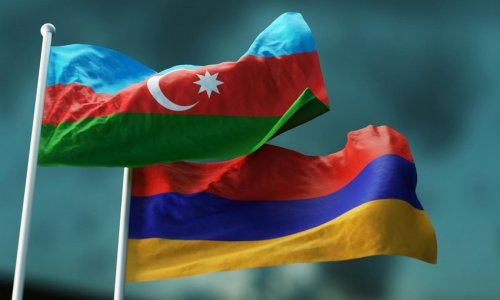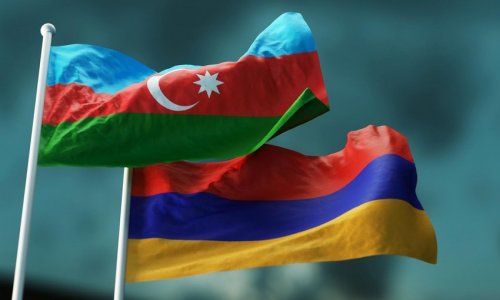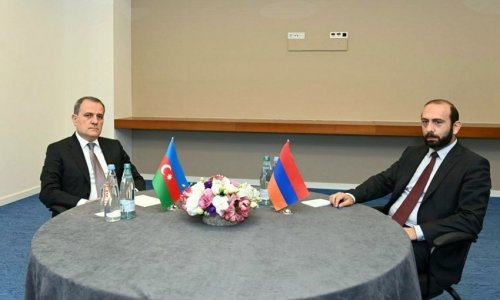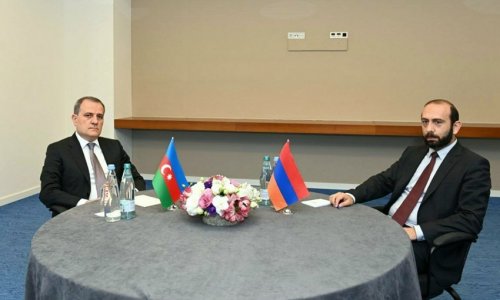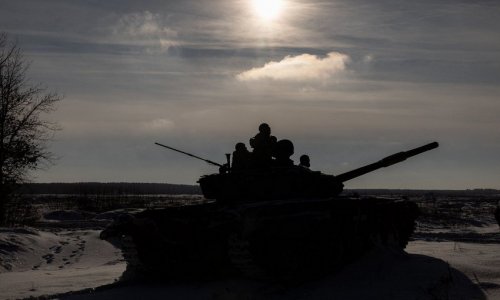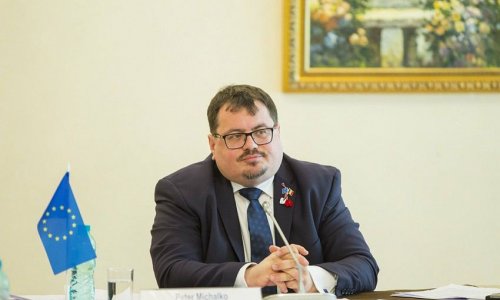Speech by President Barroso at the Azerbaijan Diplomatic Academy University on June 14:
Deputy Foreign Minister and Rector,
Deputy Rector,
Distinguished Guests,
Dear students,
Ladies and Gentlemen,
I am glad to be back here in Baku, after my first visit in 2011, to discover the tremendous changes that have taken place and feel for myself the dynamism of the country.
Azerbaijan is a country that has undergone radical and rapid change in a way that would have been unimaginable 25 years ago. Baku is a vibrant and modern city with energy in more than one sense of the word; building on its rich history but with an eye on the future, with skyscrapers sprouting on the shoreline of the Caspian Sea.
And this university has undergone remarkable growth since its inception, with a wonderful new, and ecological, campus. I also know that you encourage open and frank debate and this is the way it should be in a University. This Academy is testament to the recent commitment of education in Azerbaijan; and we are delighted in the European Union to have played our part here – through our Jean Monnet Programme and the Centre for Excellence in EU studies, as well as access to European Universities through Erasmus Plus.
Because education unlocks doors and opens the mind:
It enhances diplomatic and economic relations between countries and regions;
It helps to overcome prejudices and fear and nurtures tolerance;
With this openness, your desire to look to the future, and a recognition of the challenges and opportunities around you in a globalised world, in Europe and in the Caucuses, this Diplomatic Academy is the perfect setting to discuss some of the issues I want to raise with you today.
A changing world order: Globalisation
As academics, future diplomats, business leaders, representatives from civil society and journalists, I don’t need to tell you that we are going through a period that could be characterised by an acceleration of history.
We are also more interconnected and hence interdependent. Communication technologies and better, and more affordable, travel mean that we all live virtually next door to each other. Travel to different continents today is done as easily as travel within a country twenty-five years ago.
Our world has changed: the 20th Century alone saw our global population quadruple. It took 39 years to go from 3 billion to 6 billion people in the world, having taken thousands of years to reach the first 3 billion in 1960. And our economic output has increased by a factor of forty.
This change has been rapid, the context ever-evolving, in which we moved from a bipolar world during the Cold War; to a unipolar world; and now – in a globalised 21st Century – to a multipolar and many would say, apolar world, where the international political and economic landscape is no longer led by one single power; and where our decisions, as individual actors, have an impact across the world, and not just on ourselves and our physical neighbours.
Globalisation represents this new world order, a new context in which we must make decisions. A new context in which we need to work in order to secure the essential ingredients that our countries and citizens, throughout the ages, have always sought: peace, prosperity and freedom.
But, as we have also witnessed seen in recent weeks, months and years, globalisation is not a panacea for peace and collective prosperity. The flattening of the physical distances of the world has not ironed out our political and societal differences. It has not guaranteed the acceptance of universal values.
And in a globalised world, where demographics play a vital role for our future prosperity, we know that smaller countries, who don’t have the population of the United States, China or India, must find other ways to succeed.
So we must defend our ideals, our values and interests in a smarter way, in a way that is reminiscent to one of your own national stories and treasures, Jirtdan.
The European Union as a laboratory for globalisation
Ladies and Gentlemen,
This has been the motivation of the European Union, a laboratory for globalisation, a collection of Member States who have decided to come together, in the first instance to avoid the sheer destruction and devastation of war.
And in the second instance, as a way to improve collectively our living standards and wealth by working together, not against each other, tackling collective problems and benefiting from individual success.
And thirdly, in the 21st Century, in a new way – for peace and prosperity – in this new global order.
Our project has resulted in 70 years of peace, for which we received in 2012 the Nobel Peace Prize, a prize which has a connection to Azerbaijan having been originally partly funded by the Nobel Brothers’ Petroleum Company here in Baku.
70 years of stability and democracy. We have grown from 6 countries in 1957 to 28 in 2014; from individual countries, like Sweden, Hungary and the Czech Republic, with population sizes similar to your own, to a collective 507 million; representing 23% of the world’s GDP, and 12.6 trillion EUR economy, the largest in the world.
And despite recent events and pessimistic predictions by market analysts or populist forces, who think looking back is the solution to today’s and tomorrow’s problems, the European Union has remained open for business and open for membership, with Croatia joining last summer; and the Euro reinforced with Latvia joining at the start of this year, and Lithuania on course to join next year.
But it has not been plain sailing. It would be dishonest to pretend otherwise. There have been inevitable challenges and setbacks. But the formula to overcoming these has been to stick together, to engage, to compromise, to become stronger, more united and open.
Collective regional and global challenges
And this very last word – open – is very important.
Our model in the European Union is one of democracy, open societies, open economies and open regionalism. History teach us that the countries and nations who thrive were the ones who embraced change, who resisted protectionism and autarchic models, the ones who opened themselves to the world and influenced, and were influenced by, others.
This is why we in the European Union support the principle of multilateralism and international cooperation. It is in fact in our DNA. And we do it not just through words but deeds. The European Union is the major contributor to the United Nations system; we are the largest development and humanitarian donor with more than half of the overall international assistance.
We are also the largest trading block in the world and the largest source, and recipient of, overall foreign direct investment. We have signed more free trade agreements in these last five years than at any other time, and we are putting much focus on future agreements with the United States, Japan and an Investment Treaty with China.
We were at the origins of the creation of the G20 as a way to involve emerging economies in the issues of global economic governance.
For the European Union, both internally and internationally, economic and political integration has always been a means to bring people, societies and countries closer together, with an end to promote values of democracy and the rule of law, to establish peace and cooperation.
These were also the principles that were at the basis of our Eastern Partnership initiated in 2009. What happens in the countries in Eastern Europe and the southern Caucasus matters to the European Union. The countries of this region are now closer neighbours, and their security, stability and prosperity are also a strategic interest of the European Union. We have therefore proposed a framework for closer cooperation based on principles and values and establishing four major objectives: political association, economic integration, mobility and increased sectoral cooperation.
This was always an offer, a proposition. Never an imposition. This was also designed to promote more regional cooperation between Eastern Partner members and their neighbours. We have added a multilateral dimension into the Partnership to this effect. We were also open to the idea of differentiation. Ideally all countries would be closely associated to the EU, but depending on their circumstances and specificities we were ready to accommodate.
With Ukraine negotiated an agreement for more than 5 years. The agreement was initialed. And then at the last moment the previous government decided not to sign because of outside pressure. We were extremely disappointed but we also respected their decision. However, the Ukrainian people reacted, felt betrayed by this decision and decided to take their future in their own hands. And you know how the story unfolded.
This was never meant to be a power game with Russia. We do not seek exclusivity in our relations. On the contrary, we have also heavily invested throughout these years in a good relation with Russia. We also offered Russia a New Agreement which was aimed at bringing our strategic partnership to an ambitious level. Our Agreements with Eastern Partners countries are perfectly compatible with the existing FTAs that Partner countries have with Russia. We remain interested in having good relations with Russia. We are also neighbours. No one is interested in going back to a past of confrontation. At least, no-one in the European Union. But for that to happen Russia, as well as all our partners, needs to abide by international norms and values and it needs to respect the sovereign decisions of our common neighbours.
EU-Azerbaijan: Looking ahead
Ladies and Gentlemen,
This wider picture shows that – globally, and between the European Union, the Eastern Partnership, and here in Azerbaijan - we have common challenges, which require the appropriate national, regional and international responses.
Azerbaijan was always historically a gateway. It is a land of in-betweenness where the West meets the East. What we have proposed to you is a partnership that reinforces that status; that brings Azerbaijan closer to Europe while remaining a bridge to other parts of the world.
We are already close partners in many respects. We have a strategic partnership on energy which is the backbone of our relationship, and the EU remains Azerbaijan's main trading partner with bilateral trade flows worth € 17.9 billion in 2013 (i.e. more than 42% of AZ trade). 50% of your exports go to the European Union, and 30% of your imports come from the EU.
But I think we can do better.
In the framework of the Eastern Partnership we have made Azerbaijan an offer to conclude an Association Agreement with an enhanced trade part - but not yet a free trade agreement - which would deliver a new strategic depth to our bilateral relations.
This agreement is based on values such as democracy, fundamental freedoms and rule of law. This is very important. We believe that the long term stability and prosperity of a country can only be achieved in a context of multi-party democracy and a free civil society.
In addition, we are also ready to sign a Strategic Modernisation Partnership, which can serve as a guiding document for our practical cooperation. We are interested in supporting the political, economic and societal modernisation of Azerbaijan, as expressed in your 2020 Strategy.
These negotiations are progressing and I hope that we can conclude them in the next months.
We have made good progress towards making the Southern Gas Corridor a reality, a vision that I launched with President Aliyev three years ago, to link the world’s biggest single market to the world’s largest concentration of hydrocarbons.
This is a project that can encourage greater economic cooperation, improve energy security and create over 30000 jobs in all countries along the Corridor.
Our objective remains that the entire infrastructure project along the corridor will be operational in time (by 2019). This is as important for European energy security as it is for the future economic development of Azerbaijan.
We also want to go beyond official contacts and foster closer links between our people and societies, and I count very much to build on our Visa Facilitation Agreement, Readmission Agreement and a Mobility Partnership Agreement to move further in this respect.
But I also know that Azerbaijan and the countries in the region will not be able to prosper fully and tap into all the potential of their youth if we do not reach a solution for the conflicts that still affect the region. And I know that here, closer to home, there remains the thorny issue of Nagorno-Karabakh.
Twenty years after the ceasefire peace remains elusive but it is clear that the status quo is unsustainable. The EU calls on Azerbaijan and Armenia to embark on result-oriented negotiations with a view to reaching a peace agreement and stands ready to do all it can to play a constructive role and bring about this peace and its implementation.
Conclusion
Ladies and Gentlemen,
Globalisation means we share common opportunities and challenges more than ever.
As you look towards the future, as you make the necessary reforms in your country, the European Union remains ready to support you as an equal partner.
Our partnership can grow from strength to strength, bilaterally, regionally through the Eastern Partnership as we start to look towards the next summit in Riga, and internationally, through organisations such as the WTO.
Because it is in our interests to make the necessary changes and reforms to shape the new world order.
A Partnership underpinned by a similar vision of peace and prosperity;
A Partnership of human rights, democracy, justice, social and gender equality, and a properly functioning civil society;
A Partnership that is forward-looking, ready for the digital age, with the necessary infrastructure, and with sustainable energy at its core;
A Partnership that looks to investing in education, innovation and research;
A Partnership that looks to promote these shared objectives internationally and in our collective neighbourhood.
This coming year is an exciting year for Azerbaijan, a year where big decisions can be made;
A year that will offer European countries and the world a better view of Azerbaijan, with next year’s first ever European Games a wonderful opportunity to showcase what you have to offer;
So that everyone can appreciate Azerbaijan in the same way as Reza Deghati, who said:
“Baku is like an old forgotten book that you discover in your grandmother’s attic. Once you have wiped off the dust and delved into its pages, you stand amazed at its treasures. Azerbaijan’s intellectual resources far exceed its natural resources. The real prize here is not oil but rather, history, culture and people”.
Thank you.

